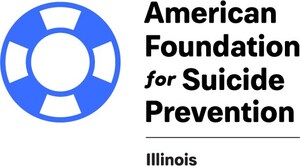WASHINGTON, July 29, 2022 /PRNewswire/ -- On Thursday, July 28, the Senate Appropriations Committee released the fiscal year 2023 (FY23) Departments of Labor, Health and Human Services, Education, and Related Agencies funding bill that will support budget investments in mental health and suicide prevention. Laurel Stine, Executive Vice President and Chief Policy Officer of the American Foundation for Suicide Prevention (AFSP) releases the following statement:
AFSP commends the Senate Appropriations Committee on release of the fiscal year 2023 (FY23) Departments of Labor, Health and Human Services, Education, and Related Agencies funding bill and thanks Chairman Patrick Leahy for his leadership and commitment to mental health. This budget includes significant investments in several mental health and suicide prevention programs, with specific funding for crisis care services. AFSP is grateful to the Committee for prioritizing suicide prevention, and encourages swift passage of this FY23 spending bill.
In 2020, nearly 46,000 Americans were lost to suicide.i We know that while suicide can affect anyone, it can be prevented through prevention, intervention, and postvention programming in addition to ending stigma and raising awareness. Vital investments in prevention and research programs can have a positive impact in reducing suicide and saving lives. According to CDC data, from August 2020 to February of 2021, over 4 in 10 adults reported experiencing anxiety or depression.ii From 2009 to 2019, the number of high school students reporting feelings of sadness or hopelessness increased by 40%, the number of those seriously considering suicide increased by 36%, and that of those creating a suicide plan increased by 44%.iii Nearly one in twenty American adults (4.9%) report having had serious thoughts of suicide in the last year.iv This budget provides necessary funding to address these troubling rates.
Among the critical allocations included in this bill is $697 million for the new 988 dialing code and National Suicide Prevention Lifeline (Lifeline). In keeping with President Biden's FY23 budget proposal, this funding would go towards strengthening and expanding the network of over 180 national and local call centers to support the ongoing implementation of the new 988 suicide and crisis hotline. By investing across all points of the crisis care continuum, this funding will enable the Lifeline to enhance technology, infrastructure, and workforce not only in its many call centers, but in mobile crisis response teams and stabilization facilities to provide essential wrap-around supports for individuals who are experiencing a mental health, substance use, or suicidal crisis.
This spending bill also offers an increase in funding for the Centers for Disease Control and Prevention Comprehensive Suicide Prevention Program of $10 million over the previous fiscal year's levels. The CDC's Comprehensive Suicide Prevention Program, currently with grant recipients in 11 states, targets populations at disproportionately high risk of suicide through approaches and programs that utilize tailored strategies to specifically address the unique needs of these communities. These groups can include Veterans, LGBTQ youth and adults, residents of rural communities, tribal populations, and youth, and specific strategies can involve reducing access to lethal means, provider education, peer programming, and provider education, among many others. AFSP has been advocating for greater investments for the Comprehensive Suicide Prevention Program, and we are grateful for the inclusion of $30 million in this spending bill.
Further investments in Mental Health Block Grants at $1.42 billion (an increase of $564 million over FY22) with an increase from 5% to 10% for the set-aside for crisis care will allow for expanded grant programs for community based mental health services. Additionally, the bill includes $385 million for Certified Community Behavioral Health Centers (CCBHCs), an increase of $70 million over FY22 as well as increases for the Garret Lee Smith Youth Suicide Prevention program through state and campus grants as well as further investments in its resource center.
The inclusion of these significant increases over the previous year's levels is extremely heartening and demonstrates the Committee's ongoing prioritization of mental health and suicide prevention in the FY23 budget. AFSP thanks the Committee for its commitment to supporting the mental health of all Americans, and urges the Senate to swiftly pass this FY23 funding bill. We look forward to Congress enacting a full FY23 budget in the coming months and to further collaboration on suicide prevention initiatives in the future.
The American Foundation for Suicide Prevention is dedicated to saving lives and bringing hope to those affected by suicide, including those who have had a loss. AFSP creates a culture that's smart about mental health through education and community programs, develops suicide prevention through research and advocacy, and provides support for those affected by suicide. Led by CEO Robert Gebbia and headquartered in New York, with an Advocacy office in Washington, DC, AFSP has local chapters in all 50 states with programs and events nationwide. Learn more about AFSP in its latest Annual Report, and join the conversation on suicide prevention by following AFSP on Facebook, Twitter, Instagram, and YouTube.
i Ehlman DC, Yard E, Stone DM, Jones CM, Mack KA. Changes in Suicide Rates — United States, 2019 and 2020. MMWR Morb Mortal Wkly Rep 2022;71:306–312. https://www.cdc.gov/mmwr/volumes/71/wr/mm7108a5.htm
ii US Department of Health and Human Services/Centers for Disease Control and Prevention. (2021). Symptoms of Anxiety or Depressive Disorder and Use of Mental Health Care Among Adults During the COVID-19 Pandemic — United States, August 2020–February 2021. https://www.cdc.gov/mmwr/volumes/70/wr/pdfs/mm7013e2-H.pdf
iii Office of the U.S. Surgeon General. (2021.) Protecting Youth Mental Health: The U.S. Surgeon General's Advisory. https://www.hhs.gov/sites/default/files/surgeon-general-youth-mental-health-advisory.pdf
iv Substance Abuse and Mental Health Services Administration. (2021.) 2020 National Survey on Drug Use and Health Annual National Report.
SOURCE American Foundation for Suicide Prevention

WANT YOUR COMPANY'S NEWS FEATURED ON PRNEWSWIRE.COM?
Newsrooms &
Influencers
Digital Media
Outlets
Journalists
Opted In




Share this article